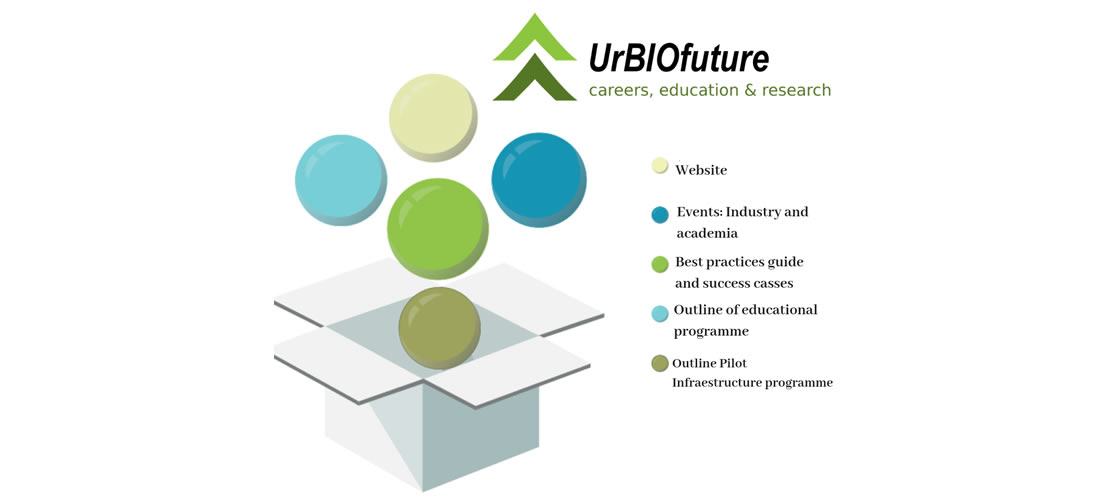
PROJECT OBJECTIVES
1 To map completed and ongoing programs addressing curricula that involve bio-based activities
2 To foster the interaction and alignment among educational and research institutions and industry
This group will include an Industry Expert Group (IEG) set-up by the Bio-based Industries Consortium (BIC). These actors will work and cooperate through dynamic workshops aimed to foster dialogue and a co-creation exercise to be conducted during the project.
3 To identify current education and professional gaps and skills mismatch in the bio-based field
4 To provide the bio-based industry and sector with a basis for promoting careers in the bio-based sector, the so-called “UrBIOfuture experience”
• A website to open a constant active communication between industry, research and academia.
• A set of open-access events
• A set of materials to be used by education organisations, academia and private sector in order to promote bio-careers and train professionals.
• A guide of best practices for academia-industry cooperation.
5 To disseminate and exploit UrBIOfuture
Communication and dissemination activities will include distribution of technical and non-technical information to internal and external stakeholders through various channels, using traditional and digital media as the e-Learning methods to engage specific target audiences.

IMPACT
Expected Impact 1 (EI1): Provide the bio-based industry and sector with an overview of completed and ongoing programmes addressing curricula that involve bio-based activities
Expected Impact 2 (EI2): Provide the bio-based industry and sector with a basis for promoting careers in the bio-based sector
Expected Impact 3. (EI3): Promote an improved and efficient alignment and interaction among industry and educational and research institutions, focusing on the needed skills and potential job opportunities in the bio-based sector.
Other impacts:
- Careers promotions in the bio-based sector and qualified employment in this field
- Improve the competitiveness of the bioeconomy in Europe
- The impulse to the creation of other programs such as UrBIOfuture that have the purpose of the development of a bio-based economy with the creation of qualified employment
- Bio-based activities as a mainstream concept in education from primary school to high educational level

IMPLEMENTATION
UrBIOfuture main goal is to bring Europe to the forefront of the bio-based sector by boosting careers, new educational programmes and research activities.
First, a map of completed and ongoing programs addressing curricula that involve bio-based activities will be developed in a wide range of educational levels and covering a wide geographical scope in the EU, in a first stage, followed by the identification of current education and professional gaps and skills mismatch in the bio-based field. These results will ensure the cooperation and alignment among educational and research institutions and industry and will set the basis for new educational programmes. For those purposes, the project methodology will be structured in three steps:
- An identification step, involving the career mapping and the pointing of skills mismatch between them and the bioindustry needs as main KPIs, alongside with a previous methodology and work terminology developed and aligned between the educational sector and the industry needs.
- An interaction step, in which the constant contact and contributions of the education sector, academia and industry will be sought throughout the project.
- The implementation of UrBIOfuture, through an appropriate Communication and Dissemination plan; the organization of promotional events, train-the-trainer and train-the-student workshops; and the development of an afterlife plan will ensure the broader impact of the results materialised in the project among the European bio-based sector.
If you want to know more about the workpackages, click here.

METHODOLOGY
To achieve the objective of bringing Europe to the forefront of the bio-based sector by boosting careers, new educational programmes and research activities, the project methodology will be structured in three steps:
(1) An identification step, involving the career mapping and the pointing of skills mismatch between them and the bioindustry needs as main KPIs, alongside with a previous methodology and work terminology developed and aligned between the educational sector and the industry needs.
(2) An interaction step, in which the constant contact and contributions of the education sector, academia and industry will be sought throughout the project. The KPIs involved will be (a) building a comprehensive stakeholder network and a working group involving representatives from each sector of the bio-based value chain. The project has already received the support of 72 organizations from bio-based industries (38 LOIs), educational institutions and networks (15 LOIs), and from innovation and research centres (19 LOIs); and (b) the organisation of two workshops in which this group will participate. The first will seek dialogue between the different profiles to validate the common terminology and methodology, and the second will consist of a co-creation exercise to set the basis for promoting careers in the bio-based sector.
(3) The implementation of UrBIOfuture, through an appropriate Communication and Dissemination plan; the organization of promotional events, train-the-trainer and train-the-student workshops; and the development of an afterlife plan will ensure the broader impact of the results materialised in the project among the European bio-based sector.
The results of UrBIOfuture will help building a bio-based industrial sector with the adequately skilled people who are able to operate innovative value chains while establishing and sustaining a solid bio-based industry in Euro


